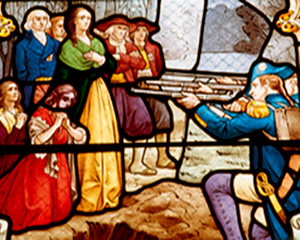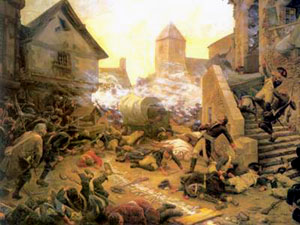 |
What People Are Commenting
Genocide in the Catholic Vendée

|
TIA,
Thank you for pointing out in your articles( here and here,) the horrors suffered by Catholics of the Vendée during the French Revolution. Their crime was to be loyal to the Church and the Crown. How many historians have distorted the truth of the horrors of the Terror, justifying every crime in order to justify a secular Republic!
I can tell you it was a shock for me to realize that the "great" Hillaire Belloc had also taken the side of the revolutionaries and the Republic. This certainly changes my view of his trustworthiness as a Catholic historian.
Anyways, I thought you would like to see this interesting news - finally the French of the Vendée are asking that the massacres of the past be recognized as the horror that it was. I'll keep you updated as to the results.
J.D.S.

Masonic Genocide of French Catholics
Henry Samuel, Telegraph, December 26, 2008
In early 1794 - at the height of the Reign of Terror - French soldiers marched to the Atlantic Vendée, where peasants had risen up against the Revolutionary government in Paris.

Massacres by the infernal columns under Turreau
|
Twelve "infernal columns" commanded by General Louis-Marie Turreau were ordered to kill everyone and everything they saw. Thousands of people - including women and children - were massacred in cold blood, and farms and villages torched.
In the city of Nantes, the Revolutionary commander Jean-Baptiste Carrier disposed of Vendéean prisoners-of-war in a horrifically efficient form of mass execution. In the so-called "noyades" [mass drownings] naked men, women, and children were tied together in specially constructed boats, towed out to the middle of the river Loire and then sunk.
Now Vendée, a coastal department in western France, is calling for the incident to be remembered as the first genocide in modern history. Residents claim the massacre has been downplayed so as not to sully the story of the French Revolution.
Historians believe that around 170,000 Vendéans were killed in the peasant war and the subsequent massacres - and around 5,000 in the noyades.
When it was over, French General Francois Joseph Westermann penned a letter to the Committee of Public Safety stating: "There is no more Vendée... According to the orders that you gave me, I crushed the children under the feet of the horses, massacred the women who, at least for these, will not give birth to any more brigands. I do not have a prisoner to reproach me. I have exterminated all."

"The Vendée will be a national cemetery" proclaimed Turreau, organizer of the infernal columns, 1793
|
Two centuries on, growing calls from local politicians to have it declared a "genocide" have sparked intellectual debate.
"There was in the Revolution a clearly stated program to wipe out the Vendean race," said Philippe de Villiers, European deputy and former presidential candidate for the right-wing traditionalist Movement for France (MPF) party.
"Why did it take place? Because a people was chosen to be liquidated on account of their religious faith. Today we demand a law officially declaring it as a genocide; we demand a statement from the president; and recognition by the United Nations."
Mr. de Villiers - who opposes Turkish entry into the EU - was in Armenia last month, where he compared the Vendée of 1794 to the 1915 massacres of Armenians. In neither case, he said, "have the perpetrators admitted their fault or asked forgiveness of the victims".
The bloody events of the Vendée were long absent from French history books, because of the evil light they shed on the revolutionaries. However, they were well known in the Soviet bloc. Lenin himself had studied the war there and drew inspiration for his policies towards the peasantry.
According to the historian Alain Gérard, of the Vendéean Centre for Historical Research, "In other parts of France the revolutionaries killed the nobles or the rich bourgeoisie. But in Vendée they killed the people.

Villiers calls the massacres in the Vendée genocide
|
"It was the Revolution turning against the very people from whom it claimed legitimacy. It proved the faithlessness of the Revolution to its own principles. That's why it was wiped out of the historical memory," he said.
While today nobody denies that massacres took place, some historians argue they cannot be called "genocide" as there were excesses on both sides in what was a civil war, and they do not fit the UN criteria of killings based on ethnic or religious identity. "The Vendéeans were no more blameless than were the republicans. The use of the word genocide is wholly inaccurate and inappropriate," said Timothy Tackett of the University of California.
For Mr. Gérard, the massacres were clearly "a deliberate policy on the part of the authorities".
For Mr. de Villiers, an aristocrat whose family seat is in the Vendée, genocide does indeed apply as his forebears were killed for religious reasons: they had rebelled to protect their priests, who refused to swear an oath to the new constitution.
"It's the rare case of a people rising up for religious reasons. They did not rebel because they were hungry, but because their priests were being killed," he said.
"It is my burden - and my great honour - to defend the Vendée to the end of my days. The Vendée is not just a province of France, it is a province of the spirit. If today we enjoy the freedom to worship the way we choose, it is largely down to the sacrifice of those who died here.".

Posted March 2, 2009

The opinions expressed in this section - What People Are Commenting -
do not necessarily express those of TIA

Related Topics of Interest
 Belloc the Liberal I - His Support of the French Revolution Belloc the Liberal I - His Support of the French Revolution
 Belloc the Liberal II - His Enthusiasm for Rousseau Belloc the Liberal II - His Enthusiasm for Rousseau
 Belloc the Liberal III - Justifying the Terror Belloc the Liberal III - Justifying the Terror
 Belloc the Liberal IV - Approving the Killing of the King Belloc the Liberal IV - Approving the Killing of the King
 The Suffering of Fr. Bardeau The Suffering of Fr. Bardeau
 Pope Bows to the Ideals of the French Revolution Pope Bows to the Ideals of the French Revolution
 Unmasking the Myth of Queen Marie Antoinette Unmasking the Myth of Queen Marie Antoinette
 The State of Mind that Generated the Revolution The State of Mind that Generated the Revolution
 Revolution and Counter-Revolution: Historic Overview Revolution and Counter-Revolution: Historic Overview

|
Comments | Questions | Objections | Home | Books | CDs | Search | Contact Us | Donate

© 2002-
Tradition in Action, Inc. All Rights Reserved
|
 |
|